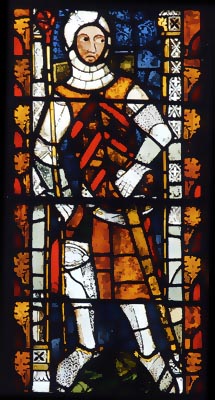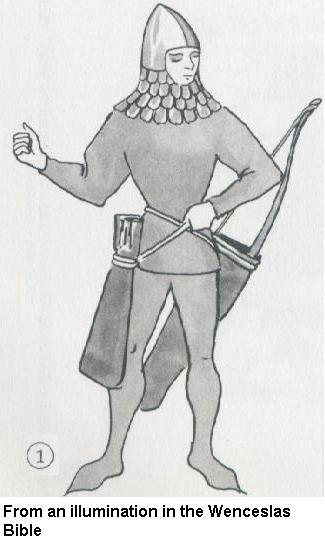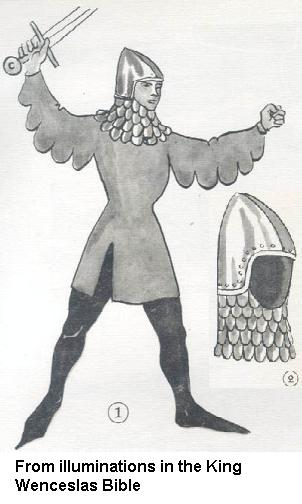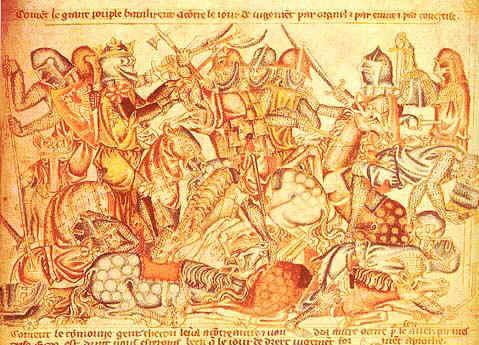Hello,
Both Revival and Mercenary's Tailor make a brigandine gorget. But I don't know of any historical representations of them.
Does anyone have examples of period or place of use, original artwork or description etc.
Thanks.
Steve we used several figures from the Osprey title "Hungary and the fall of Eastern Europe" on plate F as a loose basis. both figures are based off a combination of paintings and sculpture from the period.
hmmm, now I may have to get that title to further my research.
There are some in many 14th century artwork, two quick axamples the Taymouth Hours on a handful of knigts and the famous window at Tewkesbury Abbey- 3 of the 4 knights wears what appears to be a plate lined gorget. In my readings I think there are occasion to think they existed alongside aventails.
RPM
RPM
| Randall Moffett wrote: |
| There are some in many 14th century artwork, two quick axamples the Taymouth Hours on a handful of knigts and the famous window at Tewkesbury Abbey- 3 of the 4 knights wears what appears to be a plate lined gorget. In my readings I think there are occasion to think they existed alongside aventails.
RPM |
Hi Randall! :)
I tend to interpret the scale throat protection shown on the window of Tewkesbury Abbey as being scale aventails. They do appear to be attached to the bascinets; there are plates going under the chin that are apparently attached to the helmet rim. This is how David Nicolle chose to interpret a similar-type aventail on his drawing of Edward, the Black Prince, in Paper Soldiers of the Middle Ages Volume II: The Hundred Year's War (don't laugh, the drawings are fairly detailed and interesting, and Nicolle gives period sources in the captions for each figure). Similar scale aventails can occasionally be found in art, especially Central European art, but with "fish scale"-shaped scales. There are some drawings of these, again based on period art, in Medieval Costume, Armour, and Weapons by Eduard Wagner, Zoroslava Drobna, and Jan Durdik.
Some have argued that these only represent poorly-drawn mail, and this is certainly the case in some instances, but the scales on the Tewkesbury Abbey window clearly show rivets. If these represent a real scale aventail or similar scale throat protection, then the same could be true for some of the representations of this same sort of thing in Central European art.
There are apparently some period references to a collar of plates, but I'm not sure if the exact construction is known. I suppose it could have been made like a coat-of-plates or brigandine, although full plate gorgets are shown, albeit rarely, in early fourteenth century art. One is shown worn by the figures of "Warriors on top of an allegorical tower", from the early fourteenth century French manuscript Speculum Theologiae. There is also a possible collar of scales, although it may be fanciful, shown on a figure from the Legende de St. Denis, a French manuscript of circa 1317.
There are many period references to neck and shoulder or throat defences where the exact construction may not be known. There's clavain, a neck and shoulder protection that may have originally been a quilted defence, but it may also refer to a gorget of scales. Pizaine may have sometimes referred to a large, semi-rigid aventail. References to a bascinet a gorgiere de fer in 1266 and gorgieres de plate in 1294 may have meant some sort of scale-lined aventail, or items worn beneath the mail aventail. Many of these could have taken the general form of a "brigandine gorget", but who knows for sure? A lot of possible reconstructions of these armour pieces must be based on speculation, with some assumptions drawn from interpretations of period art.
Still, a solid-or semi-solid reinforcement for the throat, worn under the mail aventail, seems to make sense. I would imagine it could have been done.
Below, I've included an image of one of the figures from the Tewkesbury Abbey Window. Note the scale aventail (or gorget). In some of the figures, you can actually see the rivets holding the scales in place.
Stay safe!

One figure from the Tewksebury Abbey window.
Richard,
Yeah the difference of Scale and COP is a fairly fine line. I always thought of scale as shaped more than the Tewkesbury example. Eitherway solid brig-like contruction just one outside the other inside.
RPM
Yeah the difference of Scale and COP is a fairly fine line. I always thought of scale as shaped more than the Tewkesbury example. Eitherway solid brig-like contruction just one outside the other inside.
RPM
Hello all!
I wanted to post some of the images of possible scale aventails from the illustrations in Medieval Costume, Armour and Weapons by Eduard Wagner, Zoroslava Drobna, and Jan Durdik. I know this is not a primary source, but the drawings are based directly on images from various period art sources. In the case of most of the images of scale aventails, the figures are from miniatures in the King Wenceslas (Vaclav) Bible, a Bohemian manuscript dating from the end of the 14th or very beginning of the 15th century. The aventails on some, but not all, of the armed figures in the Wenceslas bible are interpreted as having scale aventails. Another image of a soldier from the Krumlov MS. folio 38, shows the warrior wearing a scale collar. Interestingly enough, there is a figure from the early 14th century Life of St. Denis that also wears a very similar scale collar. It is clearly scale in the French manuscript, suggesting that it could be in the later Bohemian manuscript as well.
 Attachment: 34.03 KB
Attachment: 34.03 KB

 Attachment: 34.56 KB
Attachment: 34.56 KB

 Attachment: 22.74 KB
Attachment: 22.74 KB

 Attachment: 34.52 KB
Attachment: 34.52 KB

I wanted to post some of the images of possible scale aventails from the illustrations in Medieval Costume, Armour and Weapons by Eduard Wagner, Zoroslava Drobna, and Jan Durdik. I know this is not a primary source, but the drawings are based directly on images from various period art sources. In the case of most of the images of scale aventails, the figures are from miniatures in the King Wenceslas (Vaclav) Bible, a Bohemian manuscript dating from the end of the 14th or very beginning of the 15th century. The aventails on some, but not all, of the armed figures in the Wenceslas bible are interpreted as having scale aventails. Another image of a soldier from the Krumlov MS. folio 38, shows the warrior wearing a scale collar. Interestingly enough, there is a figure from the early 14th century Life of St. Denis that also wears a very similar scale collar. It is clearly scale in the French manuscript, suggesting that it could be in the later Bohemian manuscript as well.




I think they look pretty cool. The ones in the west usually look square or rectangular to me. Any of the scale from the last illustrations style you know of from contemporary westen sources? It would be an interesting alternative to mail.
RPM
RPM
| Randall Moffett wrote: |
| I think they look pretty cool. The ones in the west usually look square or rectangular to me. Any of the scale from the last illustrations style you know of from contemporary westen sources? It would be an interesting alternative to mail.
RPM |
Hi Randall! :)
I've seen a couple possible scale aventails like that in western European art, but the art was on a whole so "primitive" that it could just be poorly-executed mail. Even the square or rectangular scale aventails or gorgets are fairly rare in art. I'll have to dig around and see what I come up with.
Stay safe!
Hello all!
I remembered that there was an image of an interesting plated gorget made up of small plates in the The Holkham Bible Picture Book, an English manuscript of circa 1320-30. Note in the depiction of the peers fighting the presence of some sort of rivetted plate protection at the neck. The gorget in this case is clearly made up of multiple square or rectangular plates. It could be called "scale". It's almost like an uncovered "coat-of-plates" in its construction.
 Attachment: 47.56 KB
Attachment: 47.56 KB

The Holkham Bible Picture Book, circa 1320-30, peers fighting.
I remembered that there was an image of an interesting plated gorget made up of small plates in the The Holkham Bible Picture Book, an English manuscript of circa 1320-30. Note in the depiction of the peers fighting the presence of some sort of rivetted plate protection at the neck. The gorget in this case is clearly made up of multiple square or rectangular plates. It could be called "scale". It's almost like an uncovered "coat-of-plates" in its construction.

The Holkham Bible Picture Book, circa 1320-30, peers fighting.
Richard,
Yeah I was thinking about the holkham bible as one example as well. It has a very interesting mix of items in it. In the french during th 100 years war by osprey they have a soldier in an interesting scale aventail that looks plausable.
RPM
Yeah I was thinking about the holkham bible as one example as well. It has a very interesting mix of items in it. In the french during th 100 years war by osprey they have a soldier in an interesting scale aventail that looks plausable.
RPM
| Randall Moffett wrote: |
| Richard,
Yeah I was thinking about the holkham bible as one example as well. It has a very interesting mix of items in it. In the french during th 100 years war by osprey they have a soldier in an interesting scale aventail that looks plausable. RPM |
I believe that the figure in the colour plates of a militiaman from Rennes in the Osprey book French Armies of the Hundred Years War by David Nicolle is based in part on the Tewkesbury Abbey window. That is listed as one of the main sources for the figure. The depiction of the scale aventail is very similar to the aventail shown in Nicolle's drawing of the Black Prince in Paper Soldiers of the Middle Ages Volume II: The Hundred Years War, again, a figure based in part on the Tewkesbury Abbey window.
I think these reconstructions can be valuable when used in conjunction with period art. The figures of the Rennes militiaman and the Black Prince show how a scale aventail may actually have been used.
Stay safe!
Page 1 of 1
You cannot post new topics in this forumYou cannot reply to topics in this forum
You cannot edit your posts in this forum
You cannot delete your posts in this forum
You cannot vote in polls in this forum
You cannot attach files in this forum
You can download files in this forum
All contents © Copyright 2003-2006 myArmoury.com — All rights reserved
Discussion forums powered by phpBB © The phpBB Group
Switch to the Full-featured Version of the forum
Discussion forums powered by phpBB © The phpBB Group
Switch to the Full-featured Version of the forum